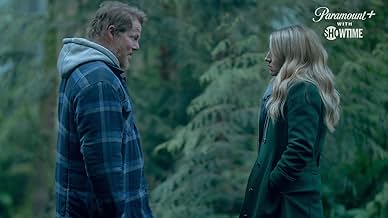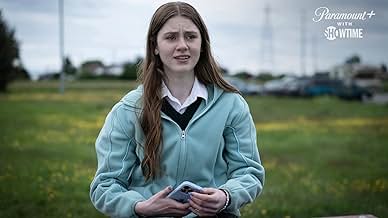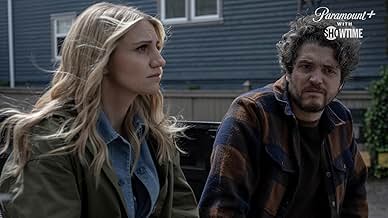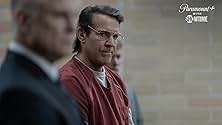Segue Melissa Jesperson-Moore, che all'età di 15 anni ha scoperto che suo padre, Keith Hunter Jesperson, era il serial killer noto come Happy Face Killer.Segue Melissa Jesperson-Moore, che all'età di 15 anni ha scoperto che suo padre, Keith Hunter Jesperson, era il serial killer noto come Happy Face Killer.Segue Melissa Jesperson-Moore, che all'età di 15 anni ha scoperto che suo padre, Keith Hunter Jesperson, era il serial killer noto come Happy Face Killer.
Sfoglia gli episodi
Recensioni in evidenza
The title pulled me in. The premise - a serial killer's daughter hiding her identity - had weight, tension, something dark and promising. And with Analeigh Ashford in the lead, I figured it had the bones to go somewhere. Episode 1 delivered. It leaned into the paranoia, the fear, the secrets.
Then the show took a wrong turn. The original premise faded, replaced by a routine detective drama padded with forgettable side characters and even more forgettable subplots. Melissa, once a compelling center, spirals into something shrill and exhausting. Her husband - a blank. Her daughter - unbearable.
But Dennis Quaid. He does something almost supernatural. As the serial killer - the actual murderer - he becomes the only one you want to watch. Charming, calm, and razor-sharp, he commands every scene with a twisted campy elegance. Somehow, he turns the monster into the magnet. You don't just understand him. You root for him.
It's a masterclass in subversion. The killer becomes the hero. Everyone else fades. And by the end, you realize the most dangerous man in the story is the only one worth following.
Then the show took a wrong turn. The original premise faded, replaced by a routine detective drama padded with forgettable side characters and even more forgettable subplots. Melissa, once a compelling center, spirals into something shrill and exhausting. Her husband - a blank. Her daughter - unbearable.
But Dennis Quaid. He does something almost supernatural. As the serial killer - the actual murderer - he becomes the only one you want to watch. Charming, calm, and razor-sharp, he commands every scene with a twisted campy elegance. Somehow, he turns the monster into the magnet. You don't just understand him. You root for him.
It's a masterclass in subversion. The killer becomes the hero. Everyone else fades. And by the end, you realize the most dangerous man in the story is the only one worth following.
I watched without knowing anything about the real crime. It seems people are just low balling this because it's not an accurate documentary. I watched for what it is intended to be, thriller entertainment and I felt each episode made me want to watch the next. They go through so many people that could be the killer but you don't know until the end and that made it extra enticing for me. I felt the acting was good and the end of each episode made me want to start the next which is what you want from a good show. If you simply watch for a thrilling entertainment based on a serial killer I don't think you'll be disappointed. If you're a crime hound wanting a true to life documentary this is not for you.
This series starts with a promising concept and an engaging atmosphere. However, the overall experience is significantly undermined by the illogical and inconsistent behavior of the main characters - they often make decisions that feel forced or completely unreasonable. On top of that, the constant use of shaky hand-held camera work becomes genuinely irritating. It's not used to enhance realism or tension, but rather seems to be a stylistic choice that adds nothing and only distracts. These two major issues prevent the show from reaching its full potential, despite the good premise and decent acting.
This is more than a story of a serial killer and true crime. After watching the first two episodes, I'm drawn in and want to see how it plays out, not necessarily because of the plot or story line but more because I became invested in the characters' lives and emotions. What is probably most compelling is how I am drawn to the character of Melissa, whose father is the serial killer. We the audience see the flash backs, her experiences, and emotions as she is now dealing with her father's new confession on a 9th victim. In real life, Melissa has written a book about her experiences, which I have not read, nor did I know anything about this story, which means my review of the series is not biased. The acting and script is also decent, and I will keep watching.
The series focuses less on the killer himself and more on the emotional wreckage his crimes have left behind for family members and victims. Annaleigh Ashford portrays Melissa with jittery vigilance, while Dennis Quaid triggers unease as the cold-eyed father with just a few glances.
The early episodes weave 1990s flashbacks together with a present-day investigation into an alleged new victim. Media frenzy, police work, and family trauma intersect, backed by a nervous score and high-contrast visuals that set warm home footage against chilly interrogation rooms.
Mid-season, however, the pacing sags. Sub-plots involving Melissa's daughter Hazel and journalist Ben feel stretched, as though the writers needed to pad out eight hours; episode 5 in particular bogs down in therapy sessions that rehash already familiar ground. Even so, the core question-does Jesperson really have another victim?-remains compelling enough to keep watching.
Strengths include the chemistry between Ashford and Quaid and the show's unflinching portrayal of violence's aftermath: no voyeuristic murder flashbacks, but rather nightmares, silence at the dinner table, and a podcast scene that neatly skewers the true-crime boom. Weaknesses are the uneven tempo, occasional tonal jolts between family drama and police procedural, and underdeveloped supporting characters.
All told, "Happy Face" delivers solid true-crime entertainment: atmospheric, thematically ambitious, yet occasionally sluggish. The plot maintains enough tension through the finale and resolves the central relationship convincingly without reinventing the genre.
The early episodes weave 1990s flashbacks together with a present-day investigation into an alleged new victim. Media frenzy, police work, and family trauma intersect, backed by a nervous score and high-contrast visuals that set warm home footage against chilly interrogation rooms.
Mid-season, however, the pacing sags. Sub-plots involving Melissa's daughter Hazel and journalist Ben feel stretched, as though the writers needed to pad out eight hours; episode 5 in particular bogs down in therapy sessions that rehash already familiar ground. Even so, the core question-does Jesperson really have another victim?-remains compelling enough to keep watching.
Strengths include the chemistry between Ashford and Quaid and the show's unflinching portrayal of violence's aftermath: no voyeuristic murder flashbacks, but rather nightmares, silence at the dinner table, and a podcast scene that neatly skewers the true-crime boom. Weaknesses are the uneven tempo, occasional tonal jolts between family drama and police procedural, and underdeveloped supporting characters.
All told, "Happy Face" delivers solid true-crime entertainment: atmospheric, thematically ambitious, yet occasionally sluggish. The plot maintains enough tension through the finale and resolves the central relationship convincingly without reinventing the genre.
Lo sapevi?
- QuizMelissa Jesperson-Moore served as a crime correspondent for the Dr. Oz show. She's also written a book about her experiences.
- BlooperVery early in the first episode, the Melissa character calls her dad in prison to tell him to leave her and her family alone. You cannot call into a prison and leave a message for an inmate, and they don't get voicemail. The most you could do is call the prison during regular hours and hope they get the message to call you back.
I più visti
Accedi per valutare e creare un elenco di titoli salvati per ottenere consigli personalizzati
Dettagli
- Tempo di esecuzione57 minuti
- Colore
- Mix di suoni
- Proporzioni
- 2.39 : 1
Contribuisci a questa pagina
Suggerisci una modifica o aggiungi i contenuti mancanti








































